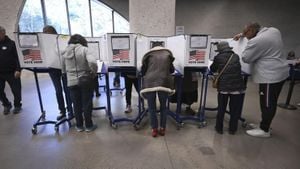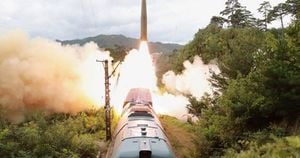The United States and Iran have found themselves entangled in yet another chapter of complicated relations, with tensions flaring up amid heightened military threats from Tehran. Over the past weeks, concerns over Iran's nuclear ambitions have escalated, leading to international calls for more severe sanctions and pressure on the Middle Eastern country.
The backdrop to this intensifying situation is Iran's continued pursuit of nuclear weapons capabilities. Following announcements from Tehran claiming it has made advancements, U.S. officials are increasingly alarmed. The U.S. has viewed Iran's development of sophisticated missile technology as provocative, raising fears of potential conflicts, particularly among allied nations within the region.
Compounding the issue is Iran's support for various proxy groups across the Middle East, including factions involved with Hezbollah and rebel forces. This support is seen as part of Iran’s broader strategy to exert influence and expand its geopolitical power, often leading to violent confrontations with U.S. interests and allies, including Israel.
The Biden administration has been grappling with how to respond effectively to Iran's aggressive postures. Officials are currently exploring the possibility of reinstituting previous nuclear agreements, aiming to halt Iran’s nuclear advancements and alleviate the imminent threat they pose. Many U.S. policymakers argue for stricter sanctions alongside diplomatic negotiations, hoping to strike a balance between containment and confrontation.
Another layer of complexity is the upcoming U.S. presidential elections, which are already shaping foreign policy discussions. Both candidates, Kamala Harris and Donald Trump, have differing views on how to handle Iran, with Harris leaning more toward diplomatic solutions and Trump advocating for maximum pressure tactics. Analysts suggest the outcomes of the election could pivot the U.S. approach toward Iran, affecting not just bilateral relations but also broader dynamics within the region.
International allies, including European nations, are turning their attention to the U.S. elections as well, recognizing the potential shift could redefine their own strategies toward Iran. The European Union has often championed dialogue and cooperation, contrasting the U.S. approach, which may lead to friction should Trump's more confrontational stance regain traction.
Meanwhile, everyday Iranians wrestle with the consequences of these geopolitical tensions. Economic sanctions have significantly eroded living standards, creating popular discontent with their leaders. People are questioning the government’s handling of international relations, with many advocating for reforms and improved engagement with the West. These internal pressures could, over time, compel Iranian leaders to reconsider their nuclear ambitions and proxy engagements.
Despite this, hardliners within Iran's government remain firmly entrenched. They are likely to resist pressure from both their domestic populace and international communities, viewing any compromises as capitulation. A significant portion of the Iranian leadership maintains the narrative of resisting U.S. hegemony, employing nationalist rhetoric to garner public support.
Meanwhile, the U.S. remains committed to ensuring the security of its allies, particularly Israel. A potential conflict involving Iran could have catastrophic consequences for national and regional security. Questions loom over potential direct military engagements or pre-emptive strikes on Iranian facilities, especially if negotiations falter.
Looking forward, regional dynamics present unique challenges. Should diplomatic ties between Iran and the U.S. continue to fray, it may ignite tensions not just between the countries directly involved, but also impact neighboring regions. The broader Mediterranean and Gulf nations could find themselves more deeply embroiled as they maneuver through the fallout of U.S.-Iran relations.
Despite the challenges, occupying the political space between diplomacy and military intervention is imperative for the U.S. and its allies. The stakes are high, and the outcomes of the current diplomatic efforts may very well shape the future health of international relations, nuclear proliferation, and Middle Eastern stability.
Hence, as the U.S. gears up for its election season, its candidates are acutely aware their foreign policy positions will resonate beyond the ballot box, having potential ramifications not just for aspirations but also for global peace and stability.



